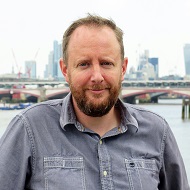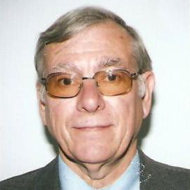Daniel Marsh is a Senior Air Quality Analyst in the measurement team at the Environmental Research Group, King’s College London, specialising in the control of dust and emissions from construction and demolition. He is currently project managing the London Low Emission Construction Partnership (LLECP), funded through the Mayor’s Air Quality Fund, which aims to raise awareness of the air quality impacts from the construction industry, promote ‘best in class’ mitigation and emission reduction practices, and measure real-world emissions from construction machinery to enhance understanding and test the efficacy of reduction efforts.
After graduating from his degree in Environmental Geology at Royal Holloway and Bedford New College, University of London, Daniel joined the South East Institute of Public Health (SEIPH) in 1996, spending several years in the team that manages the London Air Quality Network. He was involved in developing the regional networks across the South East, and also project managed the Hertfordshire and Bedfordshire Air Quality Monitoring Network (HBAQMN). During the last 10 years, he has worked closely with developers and contractor groups, shifting primary focus from control of fugitive dust to reducing diesel emissions from non-road mobile machinery. He works closely with the Mayor of London and GLA to develop tools that support the world’s first low emission zone for non-road mobile machinery, introduced in 2015.
Daniel joined the IES and IAQM in 2014, having contributed to the working groups of the IAQM’s ‘Guidance on the Assessment of Dust from Demolition and Construction’ and ‘Guidance on Air Quality Monitoring in the Vicinity of Demolition and Construction Sites’.
“After spending many years in academia, primarily working with central government and local authorities, it was useful for me to meet and share experiences with other professionals working in the air quality community.”
As well as being a regular attendee at the IAQM ‘Routes to Clean Air’ conference since its conception, Daniel was the recipient of the Ian McCrae award at the 2016 conference for ‘Outstanding Work in Air Quality’, citing the experience as a “great honour”.
Daniel considers himself a “hands-on scientist”. He thoroughly enjoys getting out onto construction and demolition sites and “playing with their machinery”, and measuring real-world emissions to further the understanding of the impacts from different activities and create the evidence base that helps the industry introduce practices that protect the health of its workers as wells as nearby residents.
“My job means that I get to meet and work with some interesting people on all sorts of projects across London. It’s always satisfying to meet someone who has never really considered the construction industry to be a source of air pollution… and see them progress to become the air quality champion within their own company.”
Daniels intends to continue working closely with the construction industry in the immediate future as part of the GLA-funded LLECP project, as well as with the GLA to support the NRMM policy for London as tighter emission standards are introduced in 2020. He is also part of the IAQM working group who are currently undertaking a review of the earlier guidance documents for construction.




